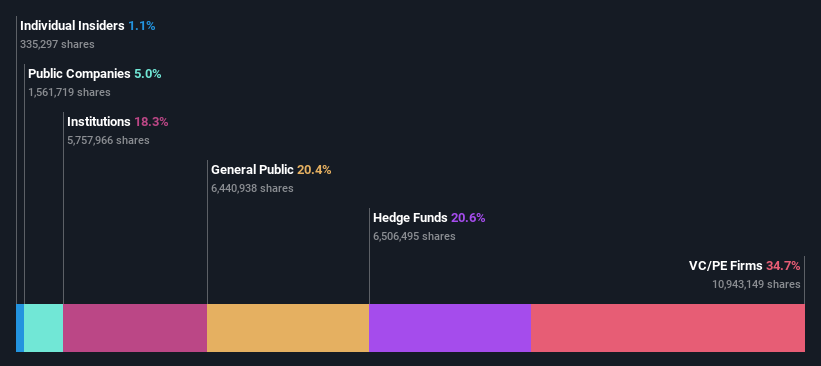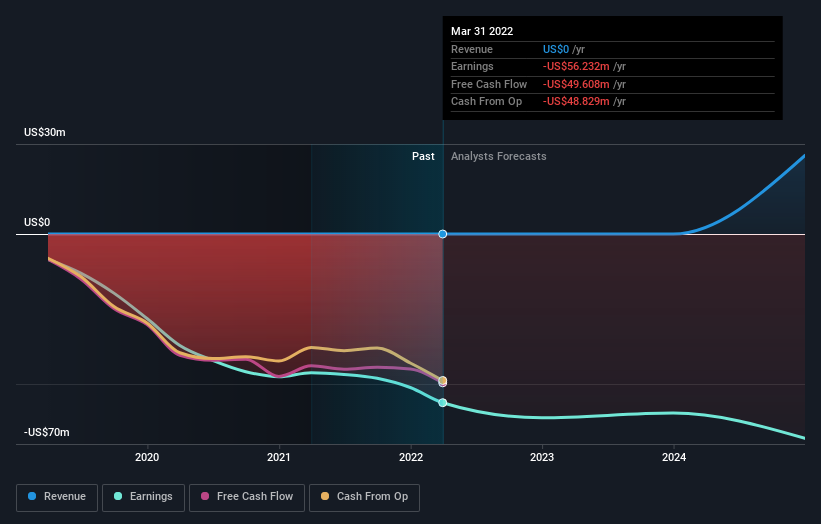What Kind Of Investors Own Most Of Satsuma Pharmaceuticals, Inc. (NASDAQ:STSA)?
A look at the shareholders of Satsuma Pharmaceuticals, Inc. (NASDAQ:STSA) can tell us which group is most powerful. Generally speaking, as a company grows, institutions will increase their ownership. Conversely, insiders often decrease their ownership over time. Companies that have been privatized tend to have low insider ownership.
Satsuma Pharmaceuticals is not a large company by global standards. It has a market capitalization of US$136m, which means it wouldn't have the attention of many institutional investors. Our analysis of the ownership of the company, below, shows that institutions are noticeable on the share registry. Let's delve deeper into each type of owner, to discover more about Satsuma Pharmaceuticals.
Check out our latest analysis for Satsuma Pharmaceuticals
What Does The Institutional Ownership Tell Us About Satsuma Pharmaceuticals?
Many institutions measure their performance against an index that approximates the local market. So they usually pay more attention to companies that are included in major indices.
We can see that Satsuma Pharmaceuticals does have institutional investors; and they hold a good portion of the company's stock. This can indicate that the company has a certain degree of credibility in the investment community. However, it is best to be wary of relying on the supposed validation that comes with institutional investors. They too, get it wrong sometimes. If multiple institutions change their view on a stock at the same time, you could see the share price drop fast. It's therefore worth looking at Satsuma Pharmaceuticals' earnings history below. Of course, the future is what really matters.
It would appear that 21% of Satsuma Pharmaceuticals shares are controlled by hedge funds. That's interesting, because hedge funds can be quite active and activist. Many look for medium term catalysts that will drive the share price higher. The company's largest shareholder is RA Capital Management, L.P., with ownership of 19%. Meanwhile, the second and third largest shareholders, hold 12% and 10.0%, of the shares outstanding, respectively. Furthermore, CEO John Kollins is the owner of 1.0% of the company's shares.
On looking further, we found that 55% of the shares are owned by the top 5 shareholders. In other words, these shareholders have a meaningful say in the decisions of the company.
While studying institutional ownership for a company can add value to your research, it is also a good practice to research analyst recommendations to get a deeper understand of a stock's expected performance. Quite a few analysts cover the stock, so you could look into forecast growth quite easily.
Insider Ownership Of Satsuma Pharmaceuticals
While the precise definition of an insider can be subjective, almost everyone considers board members to be insiders. Company management run the business, but the CEO will answer to the board, even if he or she is a member of it.
I generally consider insider ownership to be a good thing. However, on some occasions it makes it more difficult for other shareholders to hold the board accountable for decisions.
Our most recent data indicates that insiders own some shares in Satsuma Pharmaceuticals, Inc.. As individuals, the insiders collectively own US$1.4m worth of the US$136m company. This shows at least some alignment, but we usually like to see larger insider holdings. You can click here to see if those insiders have been buying or selling.
General Public Ownership
With a 20% ownership, the general public, mostly comprising of individual investors, have some degree of sway over Satsuma Pharmaceuticals. While this group can't necessarily call the shots, it can certainly have a real influence on how the company is run.
Private Equity Ownership
With a stake of 35%, private equity firms could influence the Satsuma Pharmaceuticals board. Sometimes we see private equity stick around for the long term, but generally speaking they have a shorter investment horizon and -- as the name suggests -- don't invest in public companies much. After some time they may look to sell and redeploy capital elsewhere.
Public Company Ownership
We can see that public companies hold 5.0% of the Satsuma Pharmaceuticals shares on issue. This may be a strategic interest and the two companies may have related business interests. It could be that they have de-merged. This holding is probably worth investigating further.
Next Steps:
While it is well worth considering the different groups that own a company, there are other factors that are even more important. Case in point: We've spotted 3 warning signs for Satsuma Pharmaceuticals you should be aware of, and 1 of them is a bit unpleasant.
If you are like me, you may want to think about whether this company will grow or shrink. Luckily, you can check this free report showing analyst forecasts for its future.
NB: Figures in this article are calculated using data from the last twelve months, which refer to the 12-month period ending on the last date of the month the financial statement is dated. This may not be consistent with full year annual report figures.
Have feedback on this article? Concerned about the content? Get in touch with us directly. Alternatively, email editorial-team (at) simplywallst.com.
This article by Simply Wall St is general in nature. We provide commentary based on historical data and analyst forecasts only using an unbiased methodology and our articles are not intended to be financial advice. It does not constitute a recommendation to buy or sell any stock, and does not take account of your objectives, or your financial situation. We aim to bring you long-term focused analysis driven by fundamental data. Note that our analysis may not factor in the latest price-sensitive company announcements or qualitative material. Simply Wall St has no position in any stocks mentioned.

 Yahoo Movies
Yahoo Movies 


